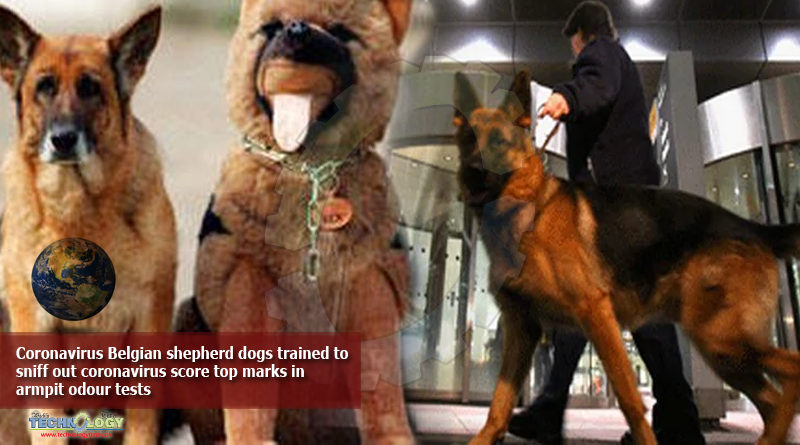Eight Malinois achieve 83 to 100 per cent success rate in experiments by French researchers shepherd Dogs’ diagnoses even lead to two ‘healthy’ subjects being retested and found positive for the pathogen

Dogs may be able to sniff out Covid-19 in infected patients, according to a new study by French scientists.
The researchers, from the National Veterinary School in Alfort, challenged eight Belgian Malinois shepherd dogs to identify coronavirus patients from odour samples taken from the armpits of more than 360 subjects, both healthy and suffering from Covid-19.
The dogs’ success rate varied from 83 to 100 per cent, according to a paper published on Friday on Biorxiv.org, a preprint website that carries studies that have not been peer-reviewed.
“We conclude that there is strong evidence that dogs can detect a person infected by the virus responsible for Covid-19 disease,” said professor Dominique Grandjean, who was part of the research team.
According to Science magazine, a dog’s nose is about 100 million times more sensitive than a human’s and previous studies have shown their ability to sniff out a variety of diseases, including diabetes and some cancers.
Grandjean’s team selected the dogs from emergency services departments in Paris and Corsica, and from a dog training centre in Beirut, Lebanon. All of the animals had previously been trained for work in search and rescue missions, detecting explosives or sniffing out colon cancer.
He said the researchers used armpit odour samples because they contained a strong chemical signal indicating a possible pathogen in the body, but not the virus itself, so as not to put the animals’ safety at risk.CORONAVIRUS UPDATEGet updates direct to your inboxSUBSCRIBEBy registering, you agree to our T&C and Privacy Policy
No living strains or viral genes have been detected in sweat samples of Covid-19 patients.
“The likelihood of infectious transmission was minimal or non-existent,” Grandjean said.
Before the experiment, the dogs were familiarised with the odour of Covid-19 and trained to sit when they encountered it.
In the test itself, which involved each dog doing between 15 and 68 identifications, four of the animals achieved a perfect score, while the others achieved an accuracy rate of between 83 and 94 per cent, the report said.
On two occasions, two of the dogs indicated a positive result for samples that the scientists had been told had come from people not infected with the coronavirus.
Despite the impressive results, the researchers said the dogs’ performance might have been even better were it not for the distraction of a television crew that filmed the experiment, and a horse that passed by the room in which they were working.
Grandjean said that although the study was small in scale it had provided proof of the concept that canine detection worked for Covid-19.
More dogs were being trained to sniff out the virus to enable larger scale experiments, he said.
Originally Publish at: https://www.scmp.com/
